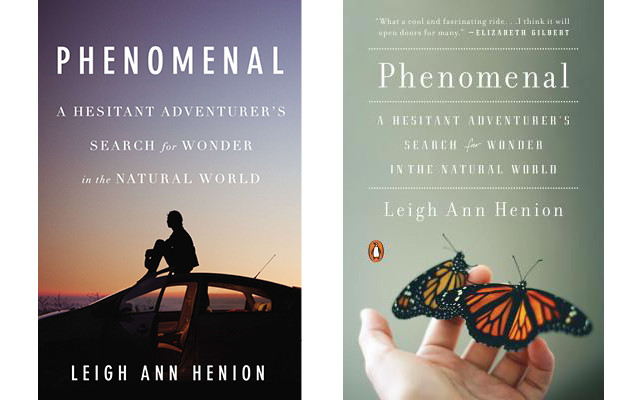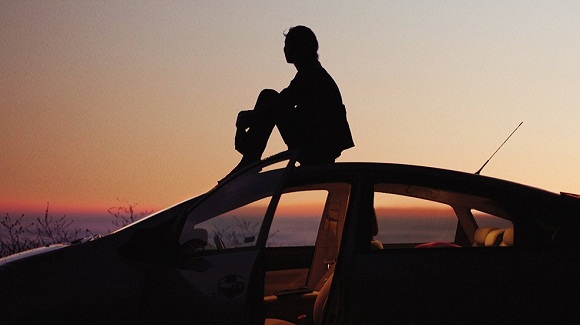When I started mapping an agenda for my extended travel last year, I planned out a combination of city-based sightseeing and nature-based exploration. I’d spend time sightseeing in European, Australian, & Asian cities, and I’d also snorkel the Great Barrier Reef, see Uluru, and take an expedition to the Arctic circle. I expected that I’d enjoy both kinds of travel equally.
I was wrong. I did love exploring cities, but the most incredible and memorable travel experiences I had during my year+ of travel were the ones I had in the great outdoors. The times I felt most transformed and most alive were when I got to witness incredible moments in nature. Since then, Graham and I have planned most of our travel to include as much nature, wildlife, and animal-watching as possible. So when I saw a new memoir called Phenomenal: A Hesitant Adventurer’s Search for Wonder in the Natural World, I didn’t hesitate for a second when I clicked “request” in NetGalley.
From the GoodReads description:
Henion’s spiritual wanderlust puts her in the path of modern-day shamans, reindeer herders, and astrophysicists. She meets laypeople from all over the world, from all walks of life, each going to great lengths to chase migrations, auroras, eclipses, and other phenomena. These seekers trust their instincts, follow their passions, shape their days into the lives they most want to lead. And somewhere along the way, Leigh Ann Henion becomes one of them.
This book hovers in the space between travel writing and nature writing. It’s interesting to note the change between the hardcover design (on the left below) and the design of the paperback that will be released next year (on the right). The former evokes traveling and wanderlust, and the latter looks much more like it belongs in the nature section. I don’t think the two aspects should be separated, their combination is what makes this book special.

Here’s why I loved this book:
1. I felt like I met a kindred spirit. Someone who feels that traveling can be a way to seek wonder from nature, and who gets their sense of spirituality or meaning from the incredible natural phenomenon we can witness and experience deeply. There are a few negative reviews on GoodReads that dismiss this book as too “hippy-dippy” – and if that’s true for them, that’s fine. I think any book that talks about finding meaning can run that risk if it reaches the wrong reader. (Henion jokes about this herself in a few places when she’s describing things that are particularly spectacular or transformative.) But for those of you who relate to this idea of gleaning wonder and meaning from the natural world instead of (or in addition to) organized religion, I think you’ll find, like I did, that this book is inspirational rather than “hippy-dippy.”
“The lightning,” he says, “it’s what you’ll never get back. Watching these storms is like spending the night in life and death. A strike of lightning is a moment in time. We get thousands of moments, but the lightning reminds us that they’re all temporary.”
“Mythology mastermind Joseph Campbell wrote: ‘God is not supposed to refer to a personality … God is simply our own notion of something that is symbolic of transcendence and mystery … We are particles of that mystery, that timeless, endless, everlasting mystery which pours forth from the abyss into the forms of the world.'”
2. It added many places to my travel bucket list. Not that it was a short list in the first place, but I am grateful that it helped me discover new experiences to dream about and plan.
3. She’s an “unconventional” wanderer. The travel writing shelves are crammed with memoirs of unencumbered people wandering all over the world and writing about it. Newly divorced women with adult children who travel to finally devote time for discovering their true selves. Men who are life-long bachelors, traveling the world and writing about what they see. Men whose wives stay home with the kids while they fly around the globe writing travel books (Hello, my beloved author Bill Bryson). Young people, like me, who are able to step completely out of their lives at home to travel for extended periods of time. Leigh Ann Henion doesn’t fit into these categories. She’s a mom of a young boy. She has a husband. But she loves traveling and seeking out phenomenal experiences around the world, and she finds a way to follow this passion, while still being a devoted mother and wife.
“Parenting is about sacrifice, that is for certain, but does being a good mother mean devoting every drop of my being to my child, or does it mean being true to my spirit in a way that illustrates that there is more than one way to live a good life? Motherhood affects everything, but does it have to change everything about who I am and what I choose to pursue?”
4. It helps explain the mindset of the Wanderer. Many people don’t understand that people who travel for extended periods of time, or seek out adventures outside the status quo, are not that different from themselves resource-wise. Henion meets many people in her travels that gave up a lot to be able to live their lives in ways that allow them to follow their passions. This way of life is much more within reach than most people realize, but it means they have a willingness to temporarily or permanently accept insecurity and uncertainty.
“I’ve got friends who — upon hearing about these seekers — will say things like: ‘Must be nice.’ I’ve come to read this as an unintentional Who do they think they are? But my time on the road has made me think those pilgrims aren’t necessarily any more privileged than anyone else. It might be nice, but it won’t be easy. They’ll be people who’ve sold their houses to make the journey, people who duck the status quo in an effort to live the sorts of lives they want to lead. They’ll be regular people trying to figure out a way to be true to the spirit within themselves — their innermost passions, their bliss.”
If you’re a kindred spirit who finds their spirituality in moments of wonder and awe provided by nature and wildlife – who feels most alive in the great outdoors: this book is for you.
“Think of how many days we take for granted in our lives, but this is one day we will never forget. We will never be able to take this for granted.”
//
Affiliate links to buy Phenomenal: IndieBound | Amazon
FTC Disclosure: I received a galley copy of this book from the publisher.

This sounds like a great book, right up my alley, and I’m putting it on my list. But I’m really taken in by your thoughts on the cover. Despite not having read the book yet, I’m with you, it seems those aspects go together and the covers are rather stark in their separation. I wonder if they’re trying to catch the people with the paperback that they did get with the net of the hardcover. I’d love to know the thinking behind those choices. Despite being a nature lover, I think the hardback cover speaks to me more as a reader. Did one or the other capture you?
I think you’ll like this one Lauren!
I wondered the same thing – if the publisher is using the paperback as an opportunity to draw in a different kind of reader. I’m with you – I was hooked by the hardcover design. I think it better reflects the spirit of the book too. It’s left me wondering if there’s a way to combine the two elements more in one cover – using the spirit of travel found in the first one, but better capturing the natural element as well (the sunset is beautiful but doesn’t fully embrace all the extraordinary natural phenomenon she writes about in the book. I keep going back to solar eclipses (which she writes about) and the potential for an incredible cover.
I think so, too. It actually sounds a little bit like the book I just started – Satellites in the High Country: Searching for the Wild in the Age of Man. It’s definitely high on my list. It’s interesting, because not even having read the book I think the hardcover speaks to it better. The butterflies for some reason speak to me of wellness (mental, physical, or otherwise) rather than exploration or nature. Weird, eh?
This sounds like a lovely read.
I especially liked your third point. I think many of the books I see in this vein involve some kind of crisis followed by transformation (I’m thinking about Girl in the Woods, Wild, etc.), and it’s nice to be reminded that we can love getting out into nature and exploring without completely reinventing ourselves at the same time.
YES! As much as I love the transformational crisis stories, it’s good to encounter someone who is fitting in travel and wonder around a more “typical” day to day lifestyle. That, combined with the beautiful nature writing, made this one a huge hit for me.